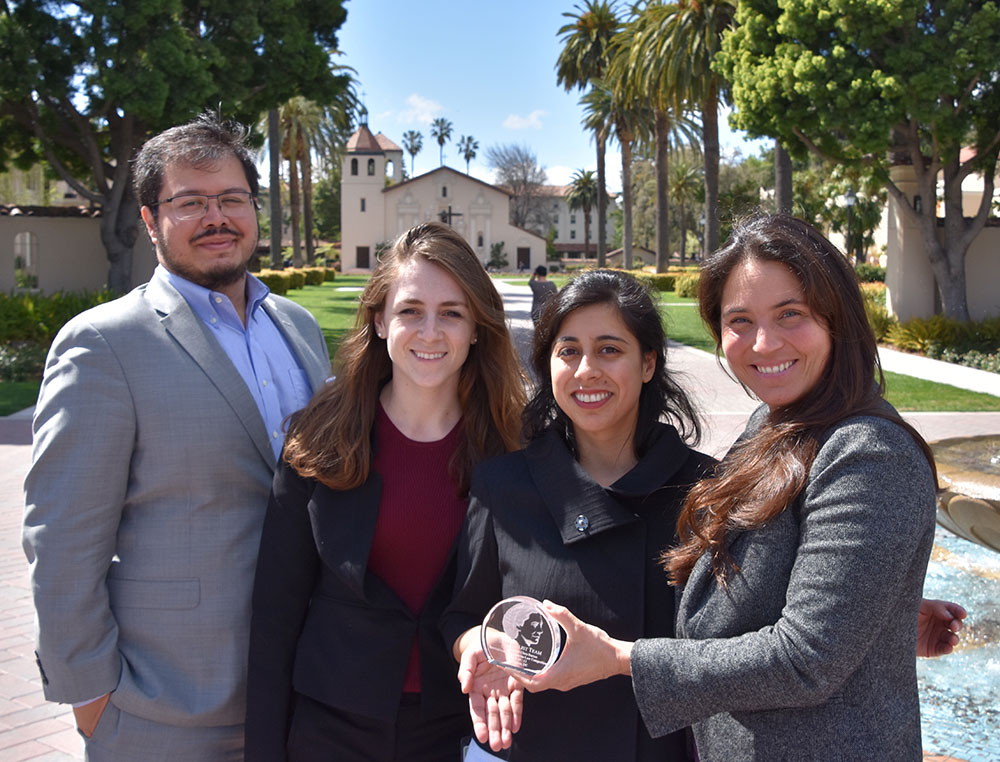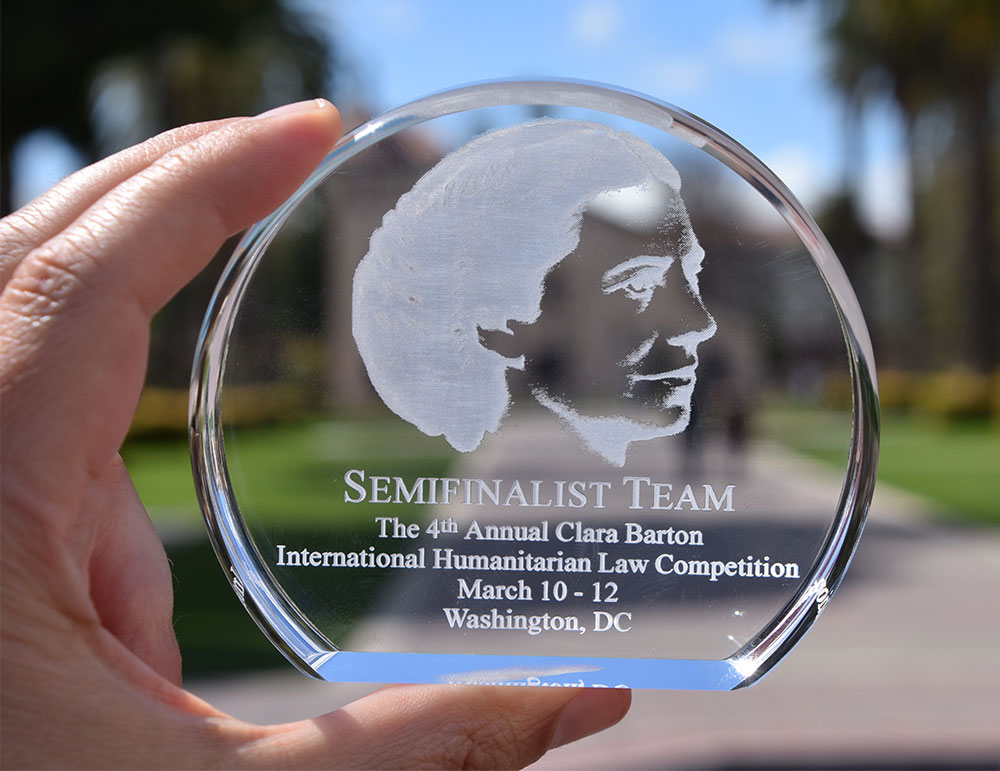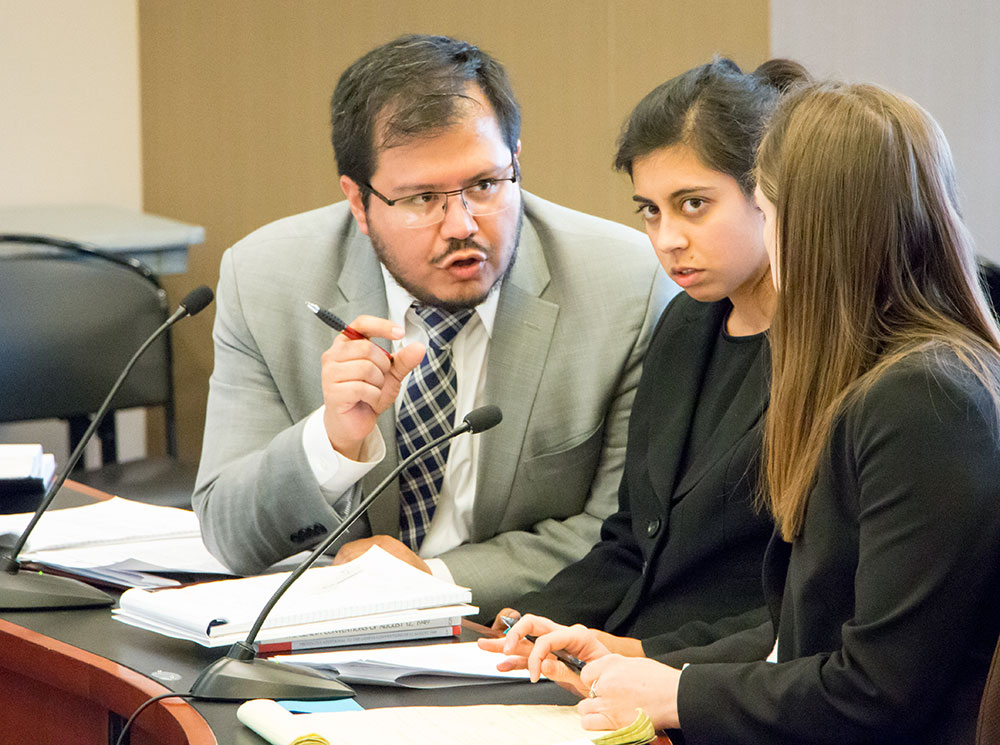On March 10-12, 2017, Santa Clara University School of Law reached the semifinals of the prestigious Clara Barton International Humanitarian Law Competition held in Washington D.C, at the Georgetown University Law Center. The Santa Clara team consisted of Sabeena Bali-Dingra 3L, Tessa Stephenson 2L, Miguel Flores 3L, and was coached by Prof. Claudia Josi.

From left: Miguel Flores, Tessa Stephenson, Sabeena Bali-Dingra, and Professor Claudia Josi
The team’s exceptional performance in this moot court competition holds up high Santa Clara’s long-standing tradition and excellence in international humanitarian law and public international law. Already in 2013, Santa Clara Law students had reached the finals of the English-speaking session in another prestigious international humanitarian law competition, the Jean Pictet Competition, held in Thailand, and in 2014 one member of the team won an award for best oralist in the same competition in Portugal.
The Clara Barton Competition is a simulation-based competition organized by the Clara Barton Competition Committee and the Canadian and American Red Cross. Named after the founder of the American Red Cross, this experiential legal competition exposes rising professionals to the practice of IHL and to real world challenges practitioners face during armed conflict.
As the organizers explain on their website, throughout the competition, participants engage in practical role playing exercises, during which they are asked to assume various professional roles and accomplish a wide range of tasks reflective of those performed by practitioners in the field. Unlike traditional moot court competitions, participants explore the application of the law through fictional, but realistic case studies of armed conflict which continue to evolve throughout the competition, offering participants a dynamic and creative atmosphere in which to explore complex legal issues. The Competition tests participants’ knowledge of international humanitarian law and public international law, as well as their ability to present, advocate for, and defend legal positions to a diverse range of stakeholders in different simulated environments. It provides the participants with a unique opportunity to address some of the most contentious and timely issues in contemporary international humanitarian law, from the legality of weapons systems, to the legal standards of the treatment of detainees, to the proportionality assessment in the use of force.

“The Clara Barton completion is the best thing I have done in Law School,” says Tessa Stephenson. “We were arguing issues that arise in real life situations and learning not only the law, but also how to work with it, how to present it in a compelling way and how to win a legal argument.” Miguel Flores adds, “This area of the law has not been my focus in law school, nonetheless, the ability to negotiate effectively, think on my feet and collaborate with my team in high-stress situations are all skills that will serve me well in any practice. I cannot understate the importance of taking advantage of every opportunity like this to develop skills and expand your horizons.” (Read more about Miguel’s impressions in La Raza’s newsletter here.)

Left to right: Miguel Flores, Sabeena Bali-Dingra, Tessa Stephenson
“The team’s amazing result is a testament to the strength of Santa Clara University School of Law’s programs in public international law and international humanitarian law,” notes Professor Claudia Josi, the team’s coach for the competition. “The team worked very hard throughout the year immersing themselves in the many aspects of international humanitarian law and meeting at least weekly for simulations. Professor Claudia Josi teaches international humanitarian law and transitional justice and coaches the school’s moot court teams for the Clara Barton Competition as well as for the Jean Pictet Competition.
“Also, the team and I are very thankful for the support of HMCE Faculty Advisor Prof. Huizar, and Profs. Evangeline Abriel, Francisco Rivera and David Sloss for their assistance in preparing them for this experience”. Professor Josi says the team’s exposure to the law school’s faculty, widely recognized for its expertise in the international law, was a contributing factor to the team’s success. "Their support enabled team members to become well versed in not only the academic aspects of international humanitarian law, but also some of the related areas of the law, such as international refugee law, and international human rights law," she said.
